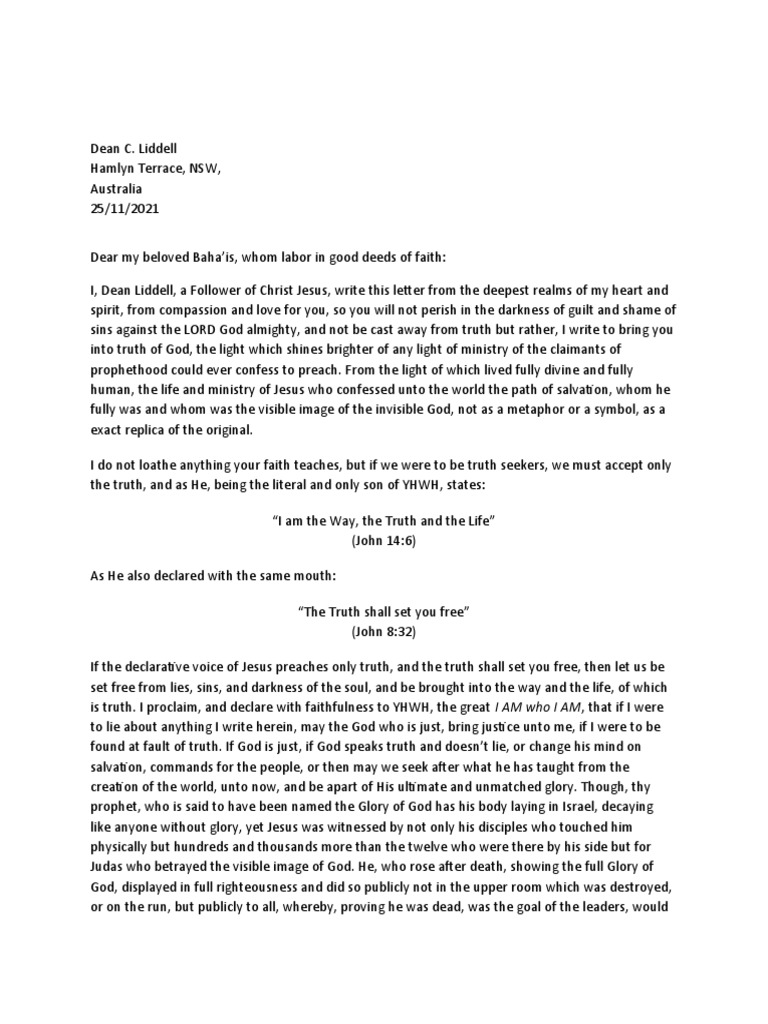In the expansive and multifaceted landscape of religious belief, one of the most intriguing intersections occurs between the Baha’i Faith and the teachings regarding Jesus Christ. Baha’is regard Jesus not merely as a central figure of Christianity, but as a profound Manifestation of God whose mission transcends sectarian confines. This delineation introduces a compelling inquiry: who is Christ to Baha’is? This exploration necessitates examining fundamental Baha’i beliefs, the significance of Jesus within this framework, and the implications of these teachings for interfaith dialogue and personal spirituality.
The Baha’i Faith posits that religious truth is not absolute but rather evolves in tandem with humanity’s intellectual and spiritual maturity. This concept is embodied in the writings of Baha’u’llah, the founder of the Baha’i Faith, who articulated the principle of progressive revelation. According to this doctrine, God periodically sends forth Divine Educators—known as Manifestations—through whom His will is revealed. These figures include not only Jesus but also Muhammad, Moses, and, importantly, Baha’u’llah Himself. Each of these Manifestations builds upon the previous teachings, thus providing humanity with a continuous stream of spiritual guidance.
In the Baha’i perspective, Jesus Christ occupies a pivotal role as one of the greatest Manifestations of God. His teachings, emphasizing love, compassion, and unity, resonate deeply within the Baha’i worldview. Baha’is respect the sanctity of Christ’s life and the transformative impact of His ministry, recognizing His pivotal contributions to ethics, theology, and human rights. Within this context, Jesus is viewed not solely as a religious figure but as an archetype of the spiritual development that each individual is encouraged to pursue.
One might ask: Why is the figure of Christ so compelling for Baha’is? The answer lies not just in Jesus’ historical significance, but also in His embodiment of universal values that transcend cultural and religious boundaries. The Baha’i teachings assert that Jesus exemplified the ideal qualities of compassion and self-sacrifice, traits which Baha’is aspire to emulate in their own lives. His life serves as a paradigm of servitude to humanity, and through meditation on His character, Baha’is deepen their understanding of Divine love and grace.
The Baha’i interpretation of Jesus’ crucifixion and resurrection is also markedly distinct and rich in symbolic meaning. Unlike traditional Christian orthodoxy, which views the resurrection as a literal event of miraculous proportions, Baha’is interpret it as a metaphor encapsulating the triumph of spiritual truths over worldly challenges. Baha’is believe that the resurrection signifies the resurgence of spiritual insight and understanding, inviting adherents to consider the resurrection in a metaphorical sense, focusing upon the awakening of the human spirit rather than merely a historical event.
Furthermore, the Baha’i teachings posit that Jesus’ return is not to be sought in the form of a second coming but is fulfilled through Baha’u’llah himself. The Baha’i Faith teaches that Baha’u’llah is the fulfillment of the prophecies found in various religious traditions, including Christianity. This innovative approach to Christ’s return emphasizes the continuity rather than the discontinuity in religious development. It fosters a sense of unity among diverse faiths, extending an invitation to dialogue that is often elusive in traditional interfaith discussions.
Recognizing Jesus as a Manifestation of God is not merely a theological assertion; it carries profound ethical implications. Baha’is are called to live out the teachings attributed to Jesus, engaged in acts of service and community-building. This requires Baha’is to navigate their own spiritual journeys while fostering a profound respect for other faith traditions, acknowledging that each contains a portion of the divine truth. The emphasis on unity—of humanity, of religion, and of purpose—serves as a cornerstone of Baha’i practice adhering to the essence of Jesus’ message: that we are all interconnected as children of one God.
Moreover, Baha’is emphasize the importance of education and the pursuit of knowledge, reflecting Jesus’ own teachings about the value of wisdom and understanding. The application of reason, the cultivation of character, and the promotion of justice are all vital tenets underscored by Baha’i writings, thus providing a comprehensive framework for engagement with Christ’s teachings. The interplay of faith and reason is seen as essential in nurturing a deeper understanding of both spiritual and worldly matters.
In summary, understanding who Christ is to Baha’is culminates in a rich tapestry of beliefs that reverberate through their daily lives and interactions with the broader world. The figure of Jesus transcends historical confines, embodying not just a religious leader but rather the epitome of divine attributes that all may aspire to reflect. Baha’is embrace Jesus as an essential guide, whose teachings illuminate the path towards unity, love, and spiritual transformation. In a multicultural and multi-religious world, recognizing the diverse interpretations of Jesus allows Baha’is to partake in a broader, more inclusive dialogue—one that celebrates both the uniqueness of individual faith expressions and the common threads that unite them all. Thus, the figure of Christ within the Baha’i Faith stands as a testament to the potential for understanding and cooperation among all humanity.
